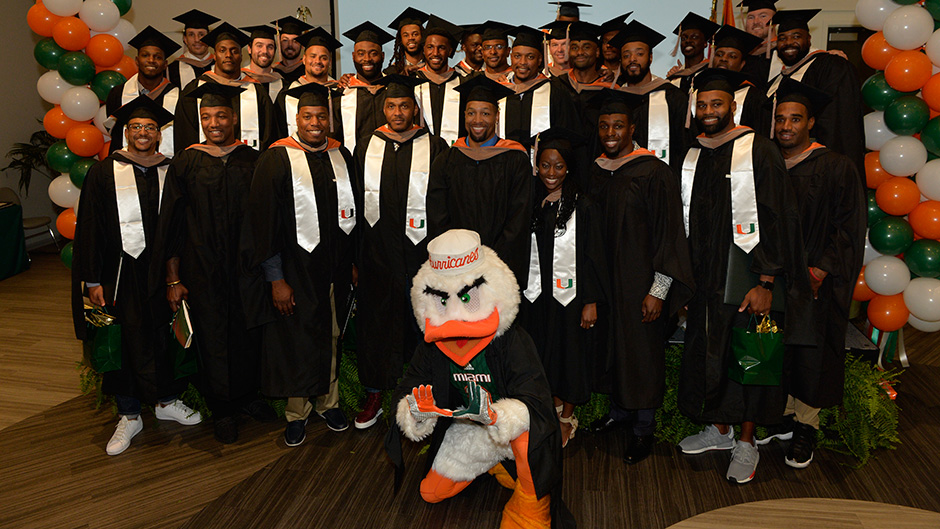They’ve earned millions of dollars in their 20’s as professional football players, and now they have the knowledge and business skills they need to continue their professional and personal success.
That’s how graduates of the inaugural class in the School’s Miami Executive MBA for Artists and Athletes program sum up their experience. More than 30 current and former NFL players graduated July 1, and some are already applying their new skills in ventures from restaurants to real estate and non-profit organizations.
Cincinnati Bengals defensive end Carlos Dunlap enrolled “to prepare for life after football:” to learn how to run a business, network and build a team for the business and choose what area to invest in. He now plans to start buying residential properties.
Juggling classes and sports was tough for the 6-foot, 6-inch, 280-pound Dunlap.
“There were a lot of long nights and early mornings, because I had to get work out before I came to school,” said the 27-year-old. Yet knowing that many athletes struggle and even go bankrupt after retirement, Dunlap found the effort “well worth it.”
Before the MBA program, retired Buffalo Bills wide receiver Lee Evans said he sometimes felt uncertain how to handle conflicting advice from different advisers on his varied investments. But now, he feels empowered “to have an independent mind to formulate my own strategy.”
The 35-year-old plans to expand his real-estate holdings beyond Wisconsin and Florida into Ohio. With tools he’s learned to measure risk, Evans also feels better equipped to analyze his stock portfolio and “decide whether I want to bring in another investment or not.”
The new program offered participants more than business knowledge too. For many retired athletes, it was a chance to bond with like-minded people.
“Like their work on the field, this MBA program is intense, demanding a significant investment of time and energy on the part of each participant,” said Anuj Mehrotra, interim dean of the University of Miami School of Business Administration. “We couldn’t be more proud of the members of this first class and the hard work they put in to it.”
Women in the program bonded too, even as they were welcomed by the men, said Xia Chekwa, 28, who graduated with her husband Chimdi Chekwa, 27, a Miami Dolphins cornerback. “There were a lot of moments we [women] just laughed at how silly they were,” said Chekwa, one of two player wives in the program.
“You definitely know you are in a room full of guys,” she added. “The conversations are different.”
So, what were some key takeaways for the graduates?
Dunlap said he’ll calibrate future investments based on this valuable lesson: “You have to spend money to make money. You make money with more risk, but you don’t want too much risk. So, you have to have a balanced portfolio.”
Chekwa plans to apply a broad view of leadership in ventures with her husband that already include a non-profit for underserved children, a barbecue restaurant set to launch in Ohio and a music-based app now in development.
“It’s less about being recognized for what you do than encouraging and empowering the people you work with – to equip the team, grow skills, inspire them and challenge them,” said Chekwa, who also holds a master’s degree in mass communications.
And what tips would graduates give people considering the program?
“Just do it,” said Evans. “This is one of those things you can talk yourself out of easily and make a lot of excuses why you can’t do it. But coming here, it’s worth it.”

